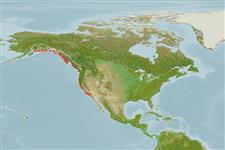Common names from other countries
>
Acipenseriformes (Sturgeons and paddlefishes) >
Acipenseridae (Sturgeons) > Acipenserinae
Etymology: Acipenser: Latin, acipenser = sturgeon, 1853 (Ref. 45335); medirostris: The specific name is derived from medirostris, referring to its moderate snout (Ref. 1998).
More on author: Ayres.
Environment: milieu / climate zone / depth range / distribution range
ນິເວດວິທະຍາ
ສັດທະເລ; ນ້ຳຈືດ; ນ້ຳກ່ອຍ ອາໄສຢູ່ໃກ້ໜ້າດິນໃຕ້ພື້ນທ້ອງນ້ຳ; ປາທີ່ມີການເຄື່ອນຍ້າຍຈາກທະເລ ແລະ ໄປໄຂ່ຢູ່ນ້ຳຈືດ (Ref. 120652); ລະດັບຄວາມເລິກ 0 - 80 m (Ref. 50610). Temperate; 10°C - 20°C (Ref. 2059); 65°N - 32°N, 166°W - 114°W (Ref. 54261)
North America: Aleutian Islands and the Gulf of Alaska to Ensenada, Mexico. Considered vulnerable in Canada. The Asian population is now considered to be a separate species Acipenser mikadoi (Ref. 6866).
Length at first maturity / ຂະໜາດ / ນ້ຳໜັກ / Age
Maturity: Lm ?, range 162 - ? cm
Max length : 270 cm TL ຕົວຜູ້/ບໍ່ມີເພດ; (Ref. 96339); common length : 130 cm TL ຕົວຜູ້/ບໍ່ມີເພດ; (Ref. 12193); ນ້ຳໜັກສູງສຸດທີ່ເຄຍຈັດພີມມາ: 159.0 kg (Ref. 2850); ອາຍຸສູງສຸດທີ່ເຄຍລາຍງານມາ: 60 ປີ (Ref. 72476)
ຄີ (ໜາມ)ແຂງຢູ່ຫຼັງປາ (ທັງໝົດ) : 0; ຄີຫຼັງຂອງປາ (ຄີອ່ອນ) (ທັງໝົດ) : 33 - 35; ຄີ(ໜາມ) ແຂງຢູ່ຄີກົ້ນປາ
ກຸ່ມປາກະດູກແຂງ
ຄວາມຖີ່ຂອງກຸ່ມຖ່າຍທອດພັນ
ປາທີ່ມີການເຄື່ອນຍ້າຍຈາກທະເລໄປຫານ້ຳຈືດ ແລະນ້ຳຈືດຫາທະເລ
ປາທີ່ມີການເຄື່ອນຍ້າຍຈາກທະເລແລະໄປໄຂ່ຢູ່ນ້ຳຈືດ
ຄີກົ້ນຂອງປາ
ສັດທີ່ມີກະດູກສັນຫັຼງ
ການຖ່າຍທອດທາງກຳມະພັນຈາກພໍ່ແມ່ຫາລູກ: 0; ຄີກົ້ນຂອງປາ: 22 - 28. Characterized by a single row of 1 to 4 bony plates along the midventral line between the anus and the anal fin, and about 33 to 35 rays in the dorsal fin. Dorsal arises at posterior third of the total length; anal fin arises under posterior part of dorsal; pectorals originate low on the body just behind gill opening and are large and rounded; pelvic fins arise near the anus. Generally olive to dark green, lower parts more or less whitish green; a longitudinal olive-green stripe on side between lateral and ventrolateral plates, another on midventral surface; fins grayish to pale green (Ref. 27547). Barbels usually situated closer to mouth than to snout tip; coloration of scutes along side paler than skin (Ref. 86798).
Found in estuaries, lower reaches of large rivers, and in salt or brackish water off river mouths (Ref. 5723). Probably spawns in fresh water (Ref. 27547). May cover considerable distances in the ocean (Ref. 27547). Edible but with a disagreeable taste and unpleasant odor (Ref. 1998).
Page, L.M. and B.M. Burr, 1991. A field guide to freshwater fishes of North America north of Mexico. Houghton Mifflin Company, Boston. 432 p. (Ref. 5723)
IUCN Red List Status (Ref. 130435)
Threat to humans
Harmless
Human uses
ການປະມົງ: ທີ່ເປັນການຄ້າໜ້ອຍ; ຊະນິດປາທີ່ຖືກນຳໃຊ້ເຂົ້າໃນການຫາເພື່ອເປັນເກມກິລາ: ແມ່ນ
ເຄື່ອງມື
Special reports
Download XML
ແຫຼ່ງອີນເຕີເນັດ
Estimates based on models
Preferred temperature (Ref.
115969): 9.1 - 12.7, mean 10.6 (based on 50 cells).
Phylogenetic diversity index (Ref.
82804): PD
50 = 0.5000 [Uniqueness, from 0.5 = low to 2.0 = high].
Bayesian length-weight: a=0.00324 (0.00142 - 0.00736), b=3.17 (2.99 - 3.35), in cm Total Length, based on LWR estimates for this Genus-body shape (Ref.
93245).
ຊັ້ນເຂດຮ້ອນ (Ref.
69278): 3.5 ±0.52 se; based on food items.
ຄວາມຢືດຢຸ່ນ (Ref.
120179): ຕຳ່, ປະຊາກອນຕຳ່ສຸດທີ່ໃຊ້ເວລາສອງເທົ່າ 4.5 - 14 ປີ (K=0.05-0.09).
Fishing Vulnerability (Ref.
59153): Very high vulnerability (80 of 100).
Climate Vulnerability (Ref.
125649): High to very high vulnerability (67 of 100).
